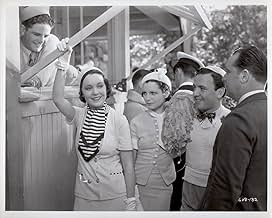After Nina Leeds finds out that insanity runs in her husband's family, she has a love child with a handsome doctor and lets her husband believes the child is his.After Nina Leeds finds out that insanity runs in her husband's family, she has a love child with a handsome doctor and lets her husband believes the child is his.After Nina Leeds finds out that insanity runs in her husband's family, she has a love child with a handsome doctor and lets her husband believes the child is his.
- Awards
- 3 wins & 1 nomination total
- Director
- Writer
- All cast & crew
- Production, box office & more at IMDbPro
Featured reviews
Did you know
- TriviaWhen Maureen O'Sullivan first met Clark Gable on the set, he was in his old-age makeup. He asked her out on a horseback-riding date, but thinking he was too old for her, she turned him down. Later when she was doing some voice-overs, she saw him without makeup and regretted her decision. Gable never asked her out again.
- GoofsAfter Charlie's last line, a shadow of the boom microphone can be seen moving off the back of the wicker chair before the camera starts pulling back.
- Quotes
Nina Leeds: [Inner thoughts] You do love me, Ned.
Dr. Ned Darrell: [Inner thoughts] I don't love you.
Charlie Marsden: [Inner thoughts] Darrell and Nina. There's something unnatural here. Love and hate and lust! Where's Sam? Why isn't he here? I hate Nina! I must punish her!
- ConnectionsReferenced in Hollywood Hist-o-Rama: Norma Shearer (1962)
- SoundtracksSymphony No.5 in E Minor, Op.64
(1888) (uncredited)
Written by Pyotr Ilyich Tchaikovsky
Excerps from the second movement played during the opening credits
- How long is Strange Interlude?Powered by Alexa
Details
- Release date
- Country of origin
- Language
- Also known as
- Slobodna ljubav
- Filming locations
- Santa Catalina Island, Channel Islands, California, USA(regatta scenes)
- Production company
- See more company credits at IMDbPro
Box office
- Budget
- $654,000 (estimated)
- Runtime
- 1h 49m(109 min)
- Color
- Aspect ratio
- 1.37 : 1

































